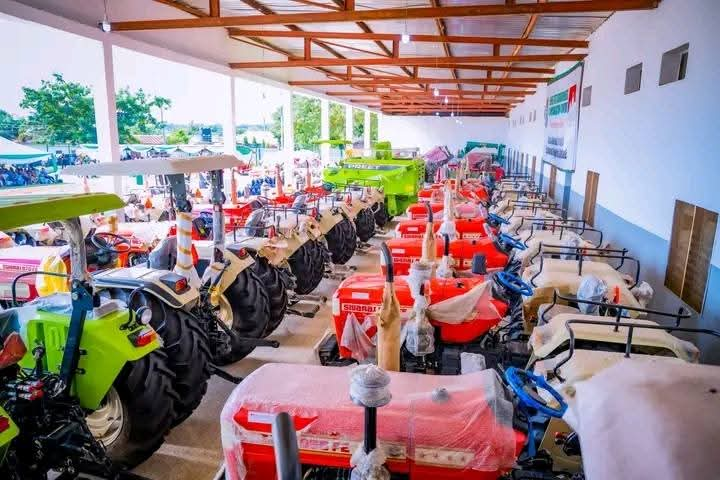Background: Benue as Nigeria’s Food Basket
For decades, Benue State has been known as the Food Basket of the Nation, thanks to its fertile soil and abundant production of crops such as yam, rice, cassava, soybean, sesame, and maize. However, recurring challenges
such as poor access to mechanization, inadequate markets, and limited financing have reduced productivity and left many farmers struggling with subsistence-level operations.
Recognizing these gaps, the Alia administration has prioritized agriculture as a pillar for economic recovery, food security, and youth employment. The new pilot programme signals a shift from rhetoric to practical action, delivering tools, technologies, and structured markets directly to farmers.
The Pilot Scheme Explained
The pilot phase of the Agricultural Mechanization Outgrower Programme will directly benefit 10 farm clusters comprising about 300 farmers. Participants will gain access to
tractors, improved seedlings, fertilizers, pesticides, and formal market linkages. Each cluster will operate as a
cooperative unit, ensuring shared resources, collective bargaining power, and easier access to credit facilities.
Importantly, the scheme also provides structured markets, which will shield farmers from exploitative middlemen
while guaranteeing better returns for their produce. By creating this direct market linkage, the programme aims to
stabilize incomes and make farming more attractive to younger generations.
Public–Private Partnerships Driving the Initiative
The programme is being implemented through a tripartite collaboration between the Bureau for Agricultural Development and Mechanization,
Mass International and Equipment Nigeria Limited, and SABASPAC International Limited. These partnerships operate under the
Benue Agribusiness and Mechanization Centre (BAMC).
By engaging credible private sector stakeholders, the state government ensures access to modern technologies,
affordable machinery, and innovations that can sustain large-scale agricultural transformation. Such partnerships
also reduce the financial burden on government while increasing efficiency.
Governor Alia’s Commitment
In his keynote remarks delivered through the Deputy Governor, Gov. Alia emphasized that mechanization and
structured markets are central to achieving food security. He assured farmers that his administration is determined to provide the enabling environment for productivity and prosperity.
“By dealing directly with manufacturers, the costs of these machines will be significantly reduced, making it
easier for the government to provide subsidies,” he noted. In a symbolic gesture, the Governor handed over the
first tractor key to the President of the Benue State Farmers Cooperative Federation, describing the programme as a “gateway to prosperity and self-sufficiency.”
Voices from the Event
Hon. Benjamin Ashaver, Commissioner for Agriculture and Food Security, described the launch as a practical step
toward transforming agriculture in Benue. He reiterated that the programme will create wealth, empower youth and
women, and reaffirm Benue’s role as a leader in agricultural innovation.
Alhaji Mohammed Yaro, representative of Mass International, disclosed plans to establish a tractor assembly and innovation hub in Benue State. This facility is expected to create 5,000 jobs while training farmers on modern mechanization techniques.
Similarly, Mr. Elias Ameh of SABASPAC International explained the Outgrower Cluster Farm model, which has already
enrolled over 120,000 farmers in its database. He revealed that the initial rollout would include 14 cooperatives representing over 360 farmers, and a revenue model would allow farmers to offset costs by providing mechanized services commercially.
Economic and Social Impact
The scheme is projected to boost agricultural productivity by at least 40% during its first cycle. With improved
access to tractors, farmers will cultivate larger hectares within shorter timelines, leading to higher yields and better market supply. The structured market model will stabilize prices, reducing post-harvest losses and increasing rural incomes.
Beyond food production, the initiative is expected to reduce youth unemployment by creating direct and indirect jobs across farming, equipment servicing, logistics, and marketing. Women, who form a large portion of smallholder farmers, will also gain increased access to inputs and training.
Challenges and Opportunities
Despite its promise, mechanization in Nigeria faces challenges such as high maintenance costs, limited financing,
inadequate rural infrastructure, and low technical know-how among farmers. The Benue pilot addresses these by introducing training programmes, subsidy models, and cooperative structures that spread costs among participants.
If successful, the pilot scheme could serve as a blueprint for scaling agricultural transformation across other
states in Nigeria.
Stakeholder Reactions
Farmer representatives at the launch commended the government’s inclusive approach and appealed for continued
subsidies on tractors and inputs. They expressed optimism that the programme will not only restore Benue’s
reputation but also ensure food sufficiency for Nigeria as a whole.
One cooperative leader Mr. Iorsoo Shima summed it up: “We want to return Benue to its rightful place as the food basket of the
nation.”
Looking Ahead
With over 120,000 farmers already registered in the Outgrower database, the pilot scheme marks the beginning of a broader transformation agenda. If implemented effectively, Benue could set the pace for mechanized farming in
Nigeria and become a model for agribusiness development in West Africa.
As implementation begins, stakeholders will be monitoring not only the distribution of inputs and tractors but also the transparency of processes, sustainability of financing models, and long-term impact on rural livelihoods.












